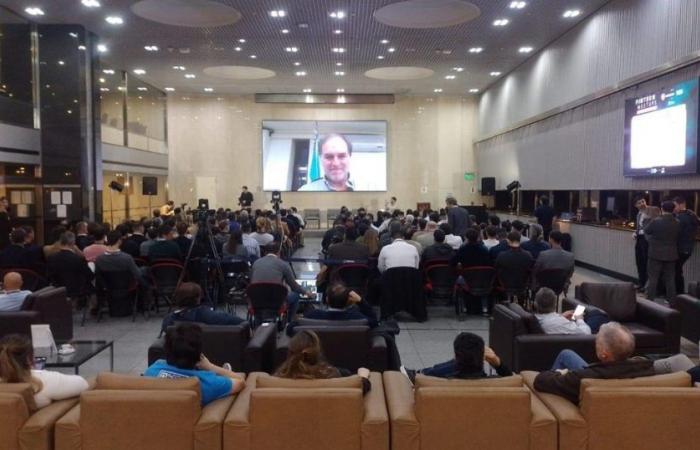The National Securities Commission (CNV) has already registered 47 virtual asset service providers, as the platforms that operate cryptoassets are called, and there are another 45 that are in the process of being authorized.
“Suppliers who applied but have not yet been admitted will still be able to continue operating; unlike those who applied and were rejected or did not apply before the closing date, which was on June 3, that they must stop providing services, and there would be about 12 platforms,” said the head of the capital market regulatory body, Roberto Silva.
The official spoke via teleconference at the Fintech Meetup Rosario organized this Thursday by the Argentine Chamber of Fintech at the Rosario Stock Exchange, with a packed trading floor.
The CNV had to create this registry of virtual asset service providers because that is how it was defined by law 25,246 (prevention of money laundering) that Congress approved in March and put in its head the control of the new subjects obliged to report financial information. such as digital asset service providers. “Only 7 off shore platforms were presented,” Silva commented.
The CNV does not regulate operations with virtual assets (unless they are a negotiable value in the capital market) but rather the platforms that provide the service, and the law mandated them to first set up the registry (because the UIF needs it for control), but it also opened the game to new regulations for the platforms.
“We are not going to poorly regulate or shackle the industry,” said the head of the CNV who also clarified that all decisions taken “will come from interacting with the sector and listening to them.” Furthermore, he clarified that “When a standard is produced, it will not only come from interaction, but will also have a prior public consultation.”
In this regard, the head of the CNV anticipated lines of work that are still under analysis. “We have a registration that can end up being converted into a license. We can think about different categories of agents or require a minimum registered net worth, segregated accounts, information requirements, modalities for obtaining orders and how to refer to agents, and even rules on misleading advertising; “You are thinking about all that,” Silva listed.
Finally, the president of the CNV highlighted that “we understand that the more we regulate, the more offshore the market will become; and we don’t want that to happen. We must adapt to the requirements of the FIU so that there are effective regulations and meet certain requirements, but finding balance and not scaring away operators; “That is our challenge.”
Expanding market
During the opening of the meeting, the executive director of the Fintech Chamber, Mariano Biocca, commented that “There are 10 million virtual asset accounts in the country, which places Argentina in the top 10/15 in terms of crypto-asset adoption and among the regional leaders in volume of digital currencies traded.”
In this context, in the “Capital Market and Crypto, where are we going?” panel, leading operators in the financial sector made it clear that the sector’s trend is one of growth. And there were three vectors that seem to support the development horizon: strength of the sector itself, greater integration with the traditional stock market and, if they materialize, the promises of lifting the restrictions and unifying the exchange system.
Operators speaking at the fintech meeting held at the Stock Exchange
The speakers were Camilo Cristia (CEO, Let’sBit) and Andrés Vilella Weisz (Head Treasury & Trading, Lemon), from renowned firms in the crypto sector, and Agustin Ramello de la Vega (CEO, Invera), Fernando Galante (CEO, Ohana) and Federico Goldberg (CEO, Manteca), from the traditional financial investment sector.
“At Lemon we imagine ourselves operating Mutual Funds and Cedears; above all because the user asks for it”, said Vilella Weisz, pointing to an example of the increasing integration between the traditional stock market and the “world” of cryptoassets.
Regarding the challenges of the sector, the platforms must now see how to maintain and add clients who, in principle, had entered attracted by the income from the “money market” funds, which now no longer offer high rates of return because the State stopped absorbing funds at high interest rates. In that sense, it did not go unnoticed that some of the push that the crypto business has in the country is due to high inflation, loss of value of the currency and restrictions on the purchase of dollars, and also by the informal economy.
However, operators stressed that if the restrictions are removed and there is exchange rate unification, the business will take a strong leap, attracting investors from abroad and generating services for the rest of the world. In a new macro scenario, it is foreseen that they will have to go in search of corporate clients (until now, the protagonists have been individuals), with more refined products (not like now), perhaps with less spread but with “a higher ticket” and offering new services more closely linked to offering (tokenized) credits in accordance with the new national economic moment.






